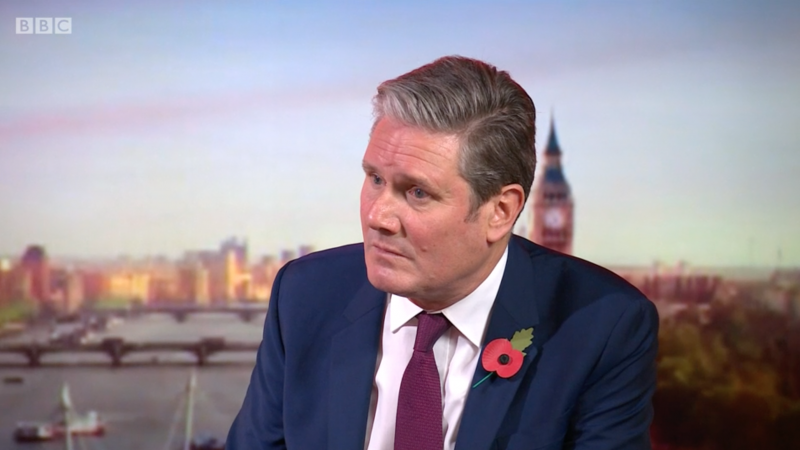
Keir Starmer has said that “I completely understand why people are concerned and are considering industrial action” but restated his opposition to standing with workers on picket lines.
In a round of interviews with regional radio stations today, the Labour leader was asked repeatedly whether he would back members of the Royal College of Nursing – which today opened the first ever UK-wide strike ballot in its 106-year history.
He told BBC Radio Devon: “I completely understand why people are concerned and are considering industrial action; we’ve had wages stuck for many, many years because the economy hasn’t been working under this government.
“I don’t want the strikes to go ahead. My wife works in the NHS – the last thing that anybody who works in NHS wants is to go on strike.”
Pressed on whether he would back the strikes, Starmer said: “I don’t want the strikes to go ahead. We want to be in government – in government you resolve issues.”
Asked whether workers such as nurses should get pay rises in line with inflation, he described that as a “question for each of the negotiations, exactly where it lands”, adding: “My job as leader of the Labour Party is to make sure we get a Labour government so we can fix the underlying problems.”
Momentum’s Hilary Schan said the Labour leader’s comments “fly in the face of Labour principles, party democracy and the public’s position” and argued that that they contradicted a motion passed at the party’s annual conference last week, which called for Labour to support “pay increases at least in line with inflation”.
300,000 workers can take part in the RCN ballot, which has been instigated following the government’s decision in July to award most NHS staff a 5% pay rise.
Ministers have claimed that the pay offer put forward by the government would lead to frontline personnel receiving a salary increase of at least £1,400. The RCN has argued that nurses should get a pay rise of 5% above inflation.
“Nurses cared for us through the pandemic, in deeply difficult circumstances, and now face a real-terms pay cut. As conference voted unanimously just last week, the Labour leadership should be out there backing our key workers and an inflation-busting pay rise. It’s time for Keir Starmer to get off the fence, and start backing the working class in this Tory cost-of-living crisis,” Schan said.
The Labour leader also rejected calls to renationalise the water industry in the UK this morning, telling BBC Radio Oxford: “I’m not ideological. I’m a practical person.” He told BBC Radio Manchester that benefits should continue to rise in line with inflation and criticised Liz Truss for not committing to the Tory manifesto pledge.
Starmer used the word “kamikaze” 27 times during the 30 minutes of interviews in reference to the ‘mini-Budget’ unveiled by Kwasi Kwarteng last month, after which the value of the pound fell to record lows and interest rates rose sharply.
He attacked the ‘trickle-down economics’ being pursued by the government, telling BBC Radio Surrey: “Liz Truss says what we need to do is make the rich richer, and somehow that will trickle down to everybody else.
“I think our economy is driven by, and the rewards ought to go to, those working people who are going out every day, actually doing the work that drives our economy.
“I totally reject the idea that what you need is unfunded tax cuts for the people at the very, very top. This is theory that was tried before didn’t work. I think it’s completely wrong. I think it’s pretty insulting.”
On a series of burst water mains in Oxfordshire and whether Thames Water should be nationalised, Starmer said: “I think [the answer is] better regulation and it is enforcing the regulations that we’ve got.
“There is a case for public ownership of some areas we’ve set out, Great British Energy for example, which would be a publicly owned company to deal with energy generation of the future. I want to change all that. So I’m not ideological. I’m a practical person.”
Labour confirmed its plans to renationalise the railways at its annual conference. The Labour leader also used his speech to the annual gathering to announce that his party would create a publicly owned energy company.
Starmer has been criticised for his stance on industrial disputes over the past year. Union leaders spoke out in opposition when the Labour leader instructed shadow frontbenchers not to attend picket lines during rail strikes in June.
999 operators joined a BT Group walkout today. The Communications Workers’ Union (CWU) had previously agreed to exempt 999 staff from the strike but changed its position after “widespread outrage at the company’s refusal to negotiate”.
Further strikes are set to take place on October 10th, 20th and 24th. The industrial action includes the 30,000 Openreach engineers and 10,000 BT call centre workers who have taken action in previous months in opposition to BT Group management’s imposition of a flat-rate pay rise of £1,500.
Lisa Nandy condemned the government as the call operators joined the strike action, accusing ministers of having “crashed the economy and poured fuel on the fire of rising inflation”, but added: “I’m not going to be on a picket line next week or in the coming weeks, I’m going to be in parliament doing my job.”




More from LabourList
‘After years of cuts, Labour’s local government settlement begins to put things right’
‘The Sherriff of Wild Westminster: what must change in elections bill’
‘The hope that kills you’: Reflections from the final day in Gorton and Denton